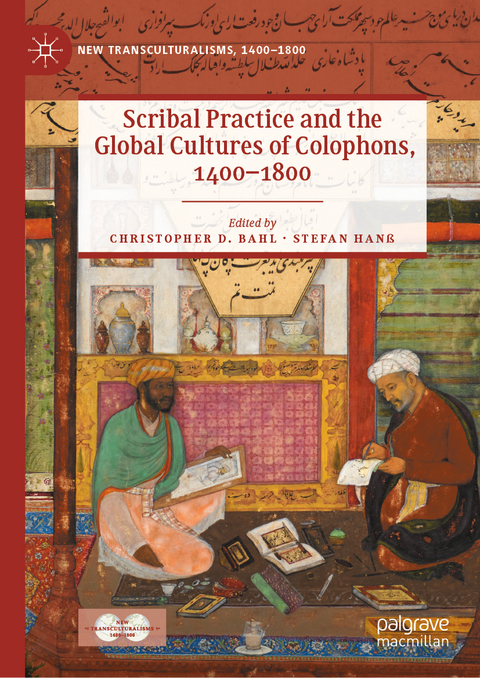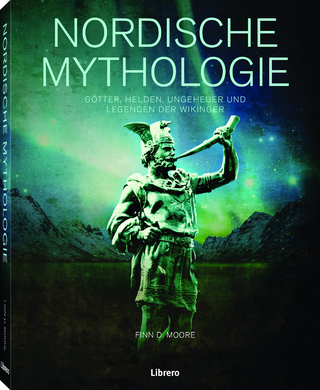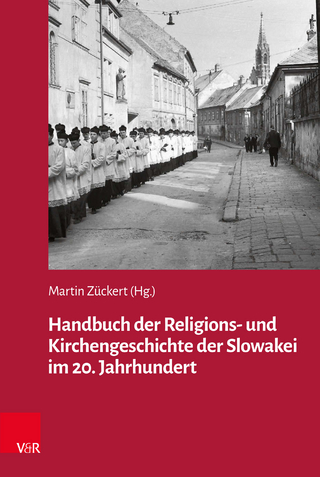
Scribal Practice and the Global Cultures of Colophons, 1400–1800
Springer International Publishing (Verlag)
978-3-030-90153-0 (ISBN)
"In its wide global range and rich variety of studies, this expertly edited volume provides an unprecedented view into the scribal practices of diverse cultural traditions in the early modern period." -Johanna Drucker, University of California, Los Angeles, USA
"This volume finally gives the colophon the place it deserves. We see scribes and printers at work in Thailand, the Deccan, Delhi, Damascus, Antwerp, and Timbuktu." -Konrad Hirschler, University of Hamburg, Germany
"In this cross-disciplinary endeavor, ten authors tell lively and exciting stories of historical scribal practices." -Verena Klemm, University of Leipzig, Germany
This book is the first to chart the global diversity of colophons between 1400 and 1800. The volume presents a new approach to scribal cultures that expands traditional definitions. Moving from the paradigm of codicological information towards a thorough interpretation of the wider social worlds of colophons in Africa, Asia, Europe, and North America, this volume uncovers the fascinating cultural history of early modern scribes. Chapters examine how those engaging in the composition and distribution of colophons shaped scribal identities, group cultures and bookish communities in a world in which manuscripts mattered. Authors build on approaches from anthropology, cultural studies, codicology, history, and philology to offer a new conceptual framework that studies colophons as scribal practices embedded in their changing social and cultural worlds. As a new contribution to the history of the book, this volume's global approach pushes the boundaries of what constitutes a colophon.
Stefan Hanss is Senior Lecturer in Early Modern History at The University of Manchester, UK, and the winner of a British Academy Rising Star Engagement Award and a Philip Leverhulme Prize. Hanss works on cultural encounters and global material culture. His research has been widely published, including in Current Anthropology, History Workshop Journal, Past & Present, Renaissance Quarterly and The Historical Journal. Christopher D. Bahl is Assistant Professor in South Asian History at Durham University, UK. He is interested in the social, cultural and political histories of the early modern western Indian Ocean world and studies those through the surviving manuscript cultures of the region.
1. Information, Interpretation, Interaction: Global Cultures of Colophons, c. 1400-1800- Christopher D. Bahl and Stefan Hanß.- 2. A Prosopography in Circulation: Advertising Scribal Travails in Arabic Manuscripts across Early Modern South Asia- Christopher D. Bahl.- 3. Lines of Loyalties and Early Modern Cultural Diversity: Colophons as Sites of Encounters- Stefan Hanß.- 4. How to Publish a Book in the Fifteenth-Century Middle East: The Case of Ibn Na s ir al-Di n's "Abundant Refutation"- Laurenz Kern.-5. Signatures of Authority: Colophons in Seventeenth-Century Melkite Circles in Aleppo- Feras Krimsti.- 6. The Making of a Local Historian in Timbuktu: The Signed Marginalia Attributed to Mahmud Ka'ti in the Fondo Kati Collection- Susana Molins Lliteras.- 7. From Scribal Marks to Calligraphic Signatures? Print, Scribe and Script in Early Modern European Writing Manuals- Hannah Murphy.- 8. Poetry of the Scribes: Versified Colophons and Scribal Identity in Siamese Manuscript Culture- Peera Panarut.- 9. Muslim Scribal Culture in India around 1800: Toward a Disentangling of the Mughal Library and the Delhi Collection- Nur Sobers-Khan.- 10. In Absence of a Colophon: Alternative Signing Practices in Arabic Autograph Manuscripts- Torsten Wollina.- 11. Remembering the Living and the Dead in Fifteenth-Century Armenian Colophons: The Case of Bodleian MS Marsh 438 (I-III)- David Zakarian.
"This volume is a welcome addition for the growing community of scholars interested in textual materialities and comparative book history. ... this review shall point out some critical perspectives from which readers can engage with this innovative and thought-provoking collection." (Hwisang Cho, Journal of Early Modern History, Vol. 27 (4), 2023)
"Scribal practice is a welcome reminder that every part of a written text is potentially significant, and that even little-known texts can open unexpected windows on the past and present." (Deborah Rudolph, EAPS, East Asian Publishing and Society, Vol. 13, 2023)
| Erscheinungsdatum | 13.06.2022 |
|---|---|
| Reihe/Serie | New Transculturalisms, 1400–1800 |
| Zusatzinfo | XIX, 303 p. 142 illus., 31 illus. in color. |
| Verlagsort | Cham |
| Sprache | englisch |
| Maße | 148 x 210 mm |
| Gewicht | 501 g |
| Themenwelt | Geisteswissenschaften ► Geschichte ► Allgemeines / Lexika |
| Geisteswissenschaften ► Geschichte ► Allgemeine Geschichte | |
| Geisteswissenschaften ► Geschichte ► Regional- / Ländergeschichte | |
| Geisteswissenschaften ► Sprach- / Literaturwissenschaft ► Anglistik / Amerikanistik | |
| Geisteswissenschaften ► Sprach- / Literaturwissenschaft ► Literaturwissenschaft | |
| Sozialwissenschaften ► Kommunikation / Medien ► Buchhandel / Bibliothekswesen | |
| Schlagworte | Codicology • Early Modern books • Early Modern publications • History of writing • Manuscript Studies • Paratexts • Prosopographies • Scribal communities • Scribal history • Scribal signatures |
| ISBN-10 | 3-030-90153-X / 303090153X |
| ISBN-13 | 978-3-030-90153-0 / 9783030901530 |
| Zustand | Neuware |
| Haben Sie eine Frage zum Produkt? |
aus dem Bereich


